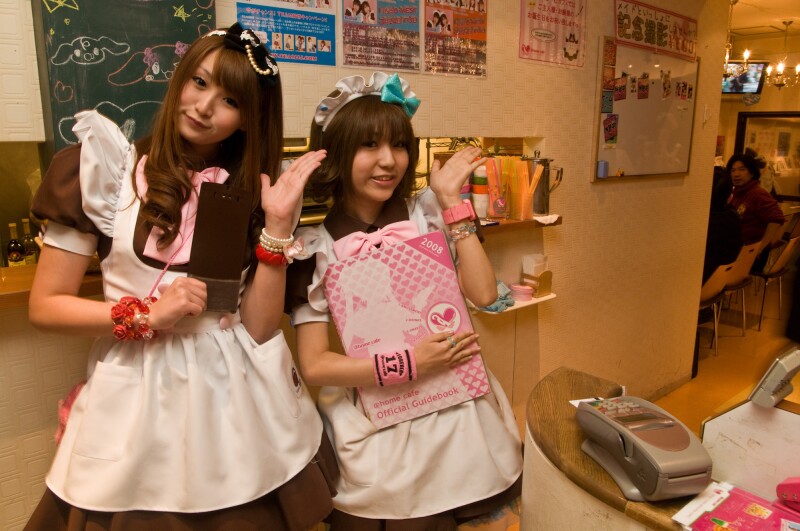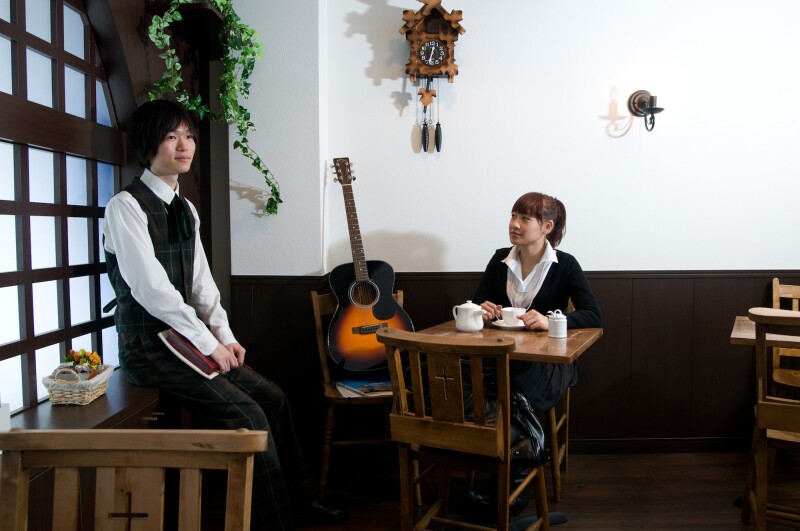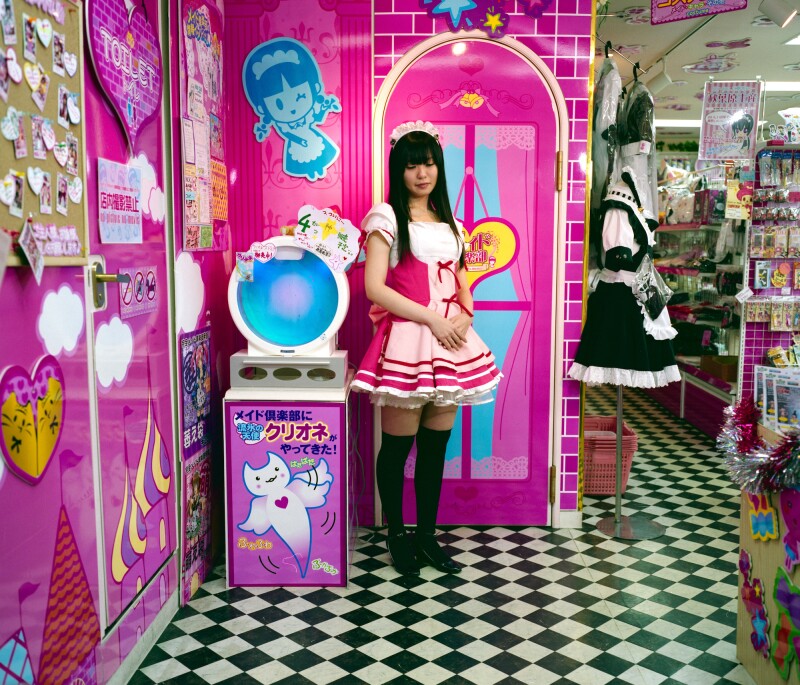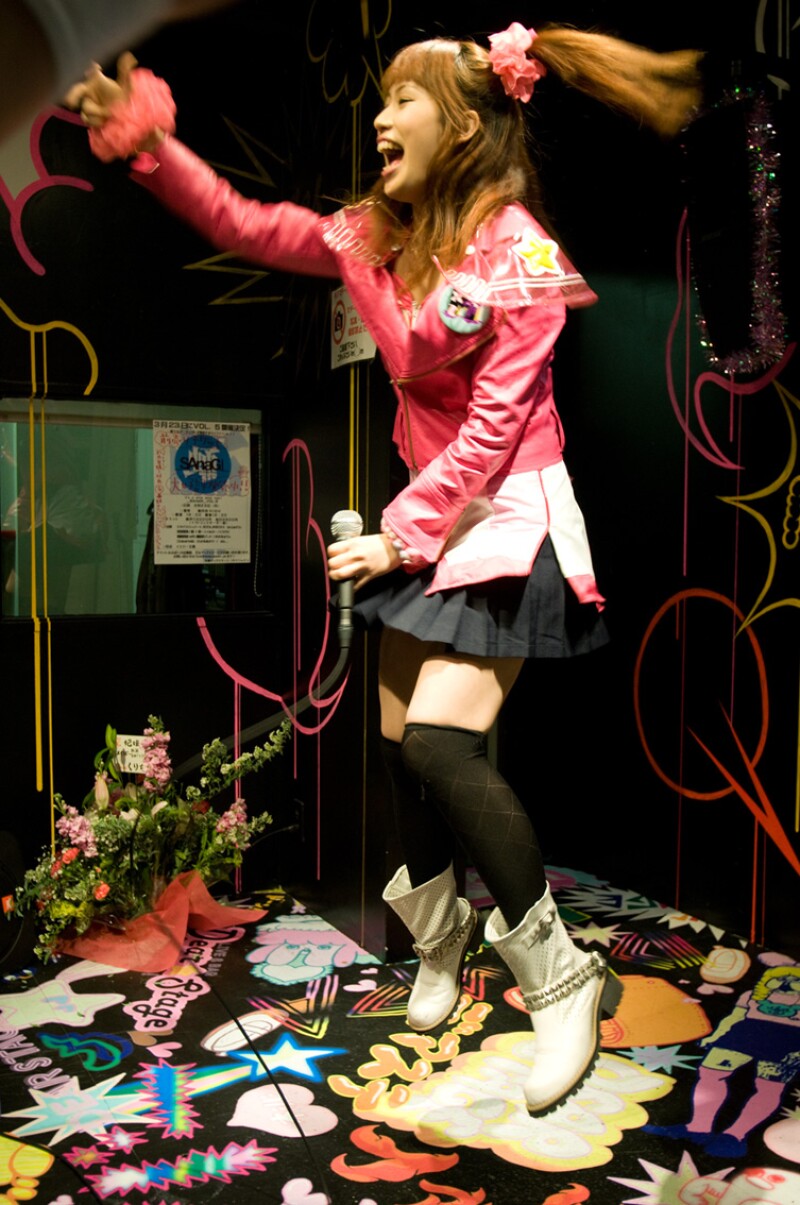The guy in the pink shirt is telling a story. He’s waving his neon-pink baseball cap in the air, gesturing wildly with his arms. I can’t make out what he’s saying because of the loud pop music in the background, but it must be funny because the pretty bleached-blond waitress in a French maid costume is leaning into him flirtatiously, laughing at his every word. He’s a regular here; all the staff members smile and wave as he scans the room confidently, his round glasses glistening in the disco lights.
I’m in @home, a “maid café” in Tokyo—a restaurant where young waitresses dress up in French maid outfits. It’s like a miniature theme park. The entryway walls are painted bright white with polka dots, and stuffed Mickey and Minnie Mouse dolls are perched on top of ledges that are lit pink and blue. A whiteboard plastered with Polaroids spotlights the dozen or so maids who work here so a customer can choose which maid to have his picture taken with. The room is full of men in their 30s and 40s who smile sheepishly as cute young maids with nicknames like “Kate from Apple Mountain” and “Liona from Raspberry Star” teach them chants that “magically” make their drinks taste better. I’m sitting in the corner drinking an iced tea and eating a rice omelet decorated with a ketchup sketch of a cat.
With me are Asuka Zenfuku, a Web designer and closet maid café addict; Ichiru Kiyota, a blogger and expert in all aspects of the otaku (geek) culture that underlies maid cafés; and Hina Nakashima, a Web site producer who helped start the first maid café in Nagoya (a large city west of Tokyo) in 2002. They are my guides on an exploration of the maid café phenomenon. @home is our first stop, and in just 45 minutes here I become acquainted with about half a dozen maids: I have my picture taken with Mai-chan, do a cocktail-blessing chant with Kuno-tan, and cheer on Nakashima as she plays a silly tabletop game with Kate. Also on our agenda: visits to a fake German boarding school that’s an offspring of the maid café culture and an otaku concert hall where shy geeks shed their inhibitions.
“Akiba is an otaku’s Disneyland,” she says. “It’s a healing oasis for people starved for connection.”
In a country where many people feel compelled to work hard to sustain a peaceful and orderly society, maid cafés offer a whimsical escape from the real world. The clientele as well as the workers are mostly otaku—Japanese geeks who are obsessed with manga (comics), anime (animated TV shows and films), and video games. In the past few years, these restaurants have come to dominate the main thoroughfare in Akihabara (known to locals as Akiba), a neighborhood that used to be more famous for selling electronics.
A maid café is a what-happens-here-stays-here kind of place, minus the sleaze and sin of Las Vegas. Visitors can shed their armor, forget about how socially awkward they are in real life, and revel in the plasticity of it all. Venues such as @home were created as places where geeks could feel, well, at home.
Anyone is welcome in a maid café, but the system succeeds only if the women who work there feel safe. Despite the skimpy costumes, maid cafés are noticeably devoid of explicit sexual tension. Behavioral boundaries between the customers and employees are defined by strict rules such as those posted outside @home’s entrance, including “You shall not touch a maid’s body” and “You shall not infringe on a maid’s privacy or ask her about her shift hours.”

JAPAN / Tokyo / Akihabara ‘Akiba’ 03/2009 / Akihabara District ‘Akiba’ also famous for the Electric City / @Home Cafe, the most famous maid cafe in Akiba, the cafe is spread in different floor, at the 7th floor maids are serving fast food and entertain customers by singing and acting like little girls .. ¬© Daniele Mattioli / Anzenberger
Photo by Daniele Mattioli
The maid café phenomenon is the descendent of a Japanese subculture that is obsessed with fantasy play. Young men and women have been dressing up in manga and anime-inspired costumes in Tokyo and elsewhere for more than 30 years. These “cosplayers,” or costume players, hang out in brightly colored bunches at amusement parks and stadiums and on the sidewalks of the Harajuku neighborhood. They are regulars at comic and game conventions. In fact, a public relations stunt by game maker Broccoli was the direct precursor to maid cafés. To promote its newest product at the Tokyo Character Show in 1998, the company dressed its booth babes in maid costumes, transforming them into waitresses at a temporary café. Outside the convention hall, fans lined up around the block to be customers.
In 2002, a PC superstore in Nagoya decided to replicate what Broccoli had done, but on a more permanent basis. The head honchos got word that my guide Hina Nakashima, at that time a college student who was producing promo videos at the store, was a cosplayer and someone who understood the significance of fantasy and role play in otaku culture. They tapped her for help.
Nakashima realized that the men didn’t just want to look at women dressed as maids; they wanted to feel like they were part of an experience. “They want to fall in love with the maids, but from a safe distance,” Nakashima explains. A maid café had to be a place where young men and women could indulge in their infatuations without the pressure to perform.
The maid café phenomenon is the descendent of a Japanese subculture that is obsessed with fantasy play.
Nakashima’s café, M’s Melody, was and still is a success, but it was @home, opened by a restaurant-consulting firm in 2005, that really addressed the craving for recognition on both sides of the maid café client-employee equation. The owners added such features as games and photo ops with maids. Regulars were granted gold and platinum membership cards, status symbols that bolstered the bearers’ self-importance. Maid “idols” took the stage for impromptu singing and dancing performances; TV specials showcased the rising phenomenon. Girls from all over the country flocked to maid auditions, and male fans lined up on the streets to see their favorite idols. Today, @home welcomes hundreds of customers a day, seven days a week. Employees have recorded a chart-topping CD of anime theme songs, and high-profile mainstream J-pop producers now manage several maid idol groups.
Until a few years ago, otaku who frequented Akiba, once known as “electric town,” made mostly solo treks to manga kissa—cafés where they paid by the hour to read comics, surf the Web, play video games, and sometimes even shower or exercise. There are still more than 3,000 such cafés in Japan, but they have taken on a shady reputation. Homeless “net café refugees” sometimes move in for shelter, and Internet criminals have been known to hatch their schemes in the private cubicles. But the rise of maid cafés has transformed the image of the neighborhood: Today, there’s a good chance that someone heading to a café in Akiba is in for a laughter-filled evening with women in costumes.

JAPAN / Tokyo / Akihabara ‘Akiba’ 03/2009 / Akihabara District ‘Akiba’ also famous for the Electric City / A maid on the main street looking for customer, there are at least 30 maid cafes in Akiba and the competition between them is visible by the large number of maids on the street looking to attract clients.. ¬© Daniele Mattioli / Anzenberger
Photo by Daniele Mattioli
Under the umbrella term maid cafés, a wide range of places cater to various passions and fetishes that go beyond the original concept of women dressing up as maids and serving male customers. These days, you can find bars with themes based on robot anime series, restaurants for train geeks, and cat cafés full of surrogate pets. All along Akiba’s side streets, maid-themed establishments are stacked above electronics stores. Neon signs advertise everything from maid reflexology and maid fortune-telling to maid dry cleaning—all independent businesses that have capitalized on the craze and adopted its dress-up trappings.
The maid café boom attracts regular clientele from more conventionally hip Tokyo neighborhoods such as Shinjuku and Shibuya, too. Take Asuka Zenfuku, one of the guys accompanying me on my maid café tour. “I used to frequent nightclubs in Shibuya,” he explains during our visit to @home. “Now I’d rather come here. Shibuya is all about buying stuff, but Akiba is a place of communication.”
Dressed in a colorful sweatshirt and fancy jeans, Zenfuku doesn’t look the part of the stereotypical shy and unfashionable geek. But after finishing his workday in Shibuya, he usually makes his way here to hang out with the girls in @home. In fact, he comes here so often that all of them know his name. When we walked in, they eagerly flocked to his seat. Zenfuku beamed at the attention. “You see what I mean?” he said with a huge grin. Nakashima agrees. “Akiba is an otaku’s Disneyland,” she says. “It’s a healing oasis for people starved for connection.”
Indeed, the social interaction is a big reason why women—and some men—work as maids. In between stops on my café tour, I meet up with journalist Mew Kurusu for coffee near his house in Tokyo’s Shinjuku business district. For a short while in 2008, Kurusu worked part-time at Hibari-Tei, a maid café with cross-dressing waiters that caters to a mostly female clientele. Kurusu is wearing a red-checked skirt, a leather jacket, and red nail polish—an anomaly in this otherwise somber coffee shop. He daintily pushes a few buttons on his black PlayStation Portable and shows me clips of himself, in a blue maid costume, being interviewed by a Japanese TV crew. “I used to be bad at communicating,” he says, “but through my work as a maid, I learned to listen to people.”
For Mew and others, including Myu, an 18-year-old female college student who works part-time as a server at an Akiba maid café, the money is secondary. At $8 to $10 an hour (tips not allowed) a maid’s pay is slightly higher than Tokyo’s $7 minimum wage. But young men and women want the jobs so they can hang out with like-minded geeks in a safe environment. “Everyone who works in Akiba, everyone who visits Akiba,” Myu says, “is an otaku like me.”

JAPAN / Tokyo / Akihabara “Akiba” 03/2009..Harajuku district : Edelstein cafe’ : The Edelstein cafe’ if for only girls who wants to be served and have a chat with some handsome boys who work there as waiter. The cafe’ has a severe privacy policy and waiters are chosen among the best good looking boys/ The waiter near by a female customer which is looking at him. Daniele Mattioli / Anzenberger
Photo by Daniele Mattioli
Edelstein, the German boarding school, sits on top of rolling hills in the countryside. It exists sometime in the past, or maybe in the distant future. Ren, a 17-year-old junior, offers my companions and me tea in the visitors’ lounge. An antique wooden cuckoo clock signals the time: 2 p.m. Ren is studying English, he says, and enjoys playing basketball.
Of course, Edelstein isn’t actually a boarding school in Germany; it’s a café in Tokyo’s fashionable Omotesando district, near Harajuku. It attracts female otaku who enjoy the attention of good-looking men dressed as Western schoolboys.
Emiko Sakamaki, a 28-year-old event planner at a small consulting firm, created Edelstein in 2007 based on a manga she loved as a teen. She deliberately chose not to set up shop in Akiba because the serene, sophisticated atmosphere of Omotesando was more in sync with her schoolboy fantasy. Sakamaki handpicked everything from the bronze steampunk-style telephone in the entryway to the giant Harry Potter–esque window. “Once you enter Edelstein,” she says, “you are expected to become an inhabitant of this world.”
Aside from my mates, the only men inside are the boys who work—ahem, go to school—here. Next to me, a petite woman in a black pencil skirt studies the menu intently. She reads the “salon rules” on the first page, then slowly flips through the rest. She orders tea. She asks to see the “yearbook,” and peruses each photo in the fake school album with subdued but earnest interest. Ren comes to our table, and I order a salate (salad) and a kuchen (cake) dish called Juno’s Holiday. Ren has boy-band hair, a sweet smile, and a soft feminine voice. “My dad is an executive at an IT firm,” he tells me. “Edelstein is a very prestigious school, and I studied very hard to get here.”

JAPAN / Tokyo / Akihabara ‘Akiba’ 03/2009 / Akihabara District ‘Akiba’ also famous for the Electric City / A shop attendant working in one of the Maid Shop where is possible to get everything for whom wants to dress like as maid , As maid outfits is one of the most popular among Cosplay the shop provide all the dresses and gadgets they need.. ¬© Daniele Mattioli / Anzenberger
Photo by Daniele Mattioli
At first I feel a little awkward and try to force Ren to tell me his real name. But no matter what I say, I can’t get him to step outside his role. So I take off my reporter hat and indulge in the fantasy myself. I pick up the dainty golden fork and take a tiny, calculated bite of my Juno kuchen. I imagine that I’m from a neighboring girls high school, and that it’s a treat for me to be hanging out with these pretty boys who are paying all this attention to me. I ask Ren serious questions in a submissive tone. “What songs do you like to play on the piano?” “What is your favorite classic novel?” I’m fitting into my role as the curious visitor, and after a while, it starts to feel pretty natural. In fact, it feels oddly soothing not to have to be myself for this brief interlude. I could get used to this, I think, as I meekly ask for the check. Later, as we walk down the campus stairwell back into Tokyo’s city streets, otaku expert Kiyota says to me, “Wow. That place really brought out your girly spirit. You’re totally glowing.”
The mecca of maid-dom is Dear Stage, an entertainment complex that occupies a tall building just a few blocks from @home. The second and third floors are themed cafés—a regular maid café and a women-dressed-as-men danso café, respectively—and the ground floor houses the first and only live concert hall just for maid idols, women who have moved up from places like @home to become solo performers of bouncy anime theme songs. “All our prospective staff are required to sing at the interview,” says Mofuku-chan, the CEO of Dear Stage. We’re chatting over a plate of sausages that a waitress at the third-floor café, a pretty lady dressed in a man’s army uniform, has brought us. “Getting a position here now is like trying to get a string through a needle.”
It looks ridiculous, but it doesn’t matter—in maid land, everyone is special; everyone fits in.
People come to Dear Stage for drinks and entertainment, but the venue is most famous as a place for otagei, a swinging, shouting dance maid fans do to “give energy” to the performer onstage. Distinguished by organized routines with exaggerated movements—like over-the-top cheerleading—otagei is a new style, created in Akiba. Before Dear Stage expanded to its current location a year ago, geeks used to risk police intervention by doing it in the streets. (Dancing on the sidewalk is not illegal, but too much enthusiasm could be interpreted as disturbing the peace.) “There was no safe place for otaku to go wild,” Mofuku-chan says. “Some guys come every day, even several times a day, to do otagei.”
Mitchy, a 33-year-old businessman, is one of them. He is having a beer at the second floor café. His favorite waitress here is Mirin-chan, a brown-haired maid with wide-set eyes who waves at us from the cashier’s counter when she sees us pointing at her. Mitchy, who is still in his gray striped business suit and yellow tie from a day at work, started coming to Dear Stage a year ago when a friend invited him. “I love the girls,” he says. “I saw Mirin-chan sing, and started coming back to see her every time.”

Photo by Daniele Mattioli
Mitchy’s office is half an hour away, but he comes here four or five times a week to eat dinner, socialize, and do otagei. “Dancing at clubs and singing karaoke are fun, but being here feels much more raw,” he says. All around us, men like Mitchy are sitting at white tables, either with friends or alone, calling the girls over to order drinks and make small talk.
It’s almost 8 p.m., and a crowd is forming on the concert hall floor. A skinny guy in glasses raises his arms high up in the air and “sends energy” to the empty graffiti-splattered stage. The lights dim, and a girl in a short checked skirt, baggy white sweater, and dyed auburn hair steps onstage. She greets the crowd and starts singing the theme song from the supernatural anime series Ga-rei: Zero. The men in the crowd start waving their arms and moving their hips in an awkward rhythm. They shout when she shouts, and chant when she holds a note. It looks ridiculous, but it doesn’t matter—in maid land, everyone is special; everyone fits in. “The customers at these places are strange,” Nakashima shouts over the madness. “But the girls are also geeks. So for the guys, it’s easy to talk to them. It feels comfortable to be here.”
That’s certainly true for Mitchy. “When I do otagei, I just want to be noticed by the girl onstage. I can’t think about anything else,” Mitchy says. “When I’m in Akiba, I’m still me, but it’s a me with no limits. All of us here are limitless and free.”
This article originally appeared in the Premier issue of AFAR. It has been updated to include current information.
>>Next: The Tokyo Neighborhood You Need to Know










